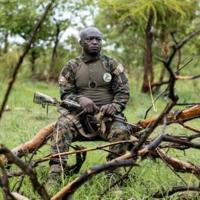Among the orange trunks of the acacia trees in the Chad savannah, a group of elephants move through Zah Soo National Park, under the supervision of one of the few humans allowed to witness the spectacle.
Created to safeguard the country’s biodiversity from the dangers of poaching and the impacts of agriculture, the park is facing criticism from local farmers who claim it has impacted their livelihoods.
Watching over the elephants with a Kalashnikov slung over his shoulder, Belfort Assia Blanga, a member of the Forest and Wildlife Guard (GFF) pointed out that the herd now consists of both juveniles and adults.
“The fact that they are reproducing shows that they now feel safe,” the ranger said — a source of pride for the park’s protectors, after 113 elephants were killed between 2013 and 2019.
The park, situated on the border with neighboring Cameroon, is now home to 125 elephants — the third largest population in the country.
Since the deployment of the GFF rangers, no elephants have been poached despite their limited resources, a lack of ammunition and “worn-out weapons”, Assia Blanga added.
However, other species in the park are still at risk from illegal hunting.
Lambert Worgue Yemye, deputy director of the protected area, stated that villagers and farmers mainly target antelope.
– Biodiversity protection –
The 815-square-kilometer (315-square-mile) park was established through a 15-year partnership between the Chadian government and the French biodiversity conservation NGO Noe.
In addition to poaching, the park’s rangers must combat herders who illegally bring their herds to graze in Zah Soo.
Cattle raising is the main economic activity in the Mayo-Kebbi West region where the park is located.
The seasonal movement of large and small livestock from nearby Cameroon, Niger, and Nigeria has a negative impact on biodiversity in Zah Soo, according to Noe.
“The cattle graze on everything they can find without raising their heads. When they pass through, they also damage the flora by trampling on it,” said Worgue Yemye.
To prevent this, the park has been impounding stray livestock herds that enter the park.
Since last year, over 2,600 cattle have been taken to the eight enclosures established in the prefectures bordering the park.
Raising awareness and addressing the issue has reduced the number of animals from 23,500 in September 2022 to 9,005 a year later, according to Noe.
Nevertheless, these actions have sparked discontent among local farmers.
“When we were consulted before the park was created, we were informed of its benefits, but not its drawbacks,” said 36-year-old Saidou Alyoum — a representative of the region’s livestock farmers.
“The Zah Soo Park extends beyond the boundaries of the Binder-Lere reserve, which has been in effect for 50 years. We are recommending that Noe and the state reduce the park size.”
In the absence of a resolution, the herders have threatened to move to Cameroon.
Noe stated that reducing the park’s size is not an option.
“We conducted a public consultation before its establishment and the majority of signatories approved its boundaries,” Worgue Yemye said.
Some village chiefs who signed the documents then reneged on their decision,” a local official told AFP anonymously.
They accused the local chiefs of encouraging the population to criticize the park because some of them charge fees to foreign herders to cross the territory—something they cannot do in the park itself.
– Compensation –
Farmer and local leader Mamadou Houssein, 60, mentioned that “the loss of grazing land for herders has worsened the conflicts between herders and farmers”.
Conflicts frequently erupt in the Sahel region between farmer and nomadic herder communities when herders allow their herds to graze on the farmers’ land.
These conflicts often result in numerous casualties, including women and children.
According to Houssein, the protected elephant herds have also destroyed his crops.
“The government should compensate us, but it is not taking any action,” the farmer said.
“We would prefer the compensation to be provided directly by Noe because we trust them more than the Chadian government.”
To compensate for the loss of pasture, Noe stated that it will supply fodder and intends to construct four drinking ponds for the cattle.
The NGO is also working to enhance living conditions for the villages around the park, such as refurbishing a water tower in Binder and repairing roads.
However, due to the insecurity in the broader region, it remains uncertain whether Noe’s investment in Zah Soo will boost the area’s tourist appeal.
jbo/hpn/gir/nmc/sbk/gv





